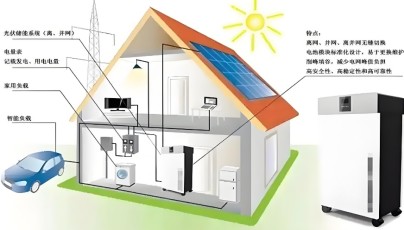Share to
Household energy storage and industrial and commercial energy storage are two main energy storage systems that are divided based on factors such as application scenarios, scale, demand, and their respective advantages. Below is a detailed analysis of the differences between the two, how to choose a suitable energy storage cabinet, and their respective advantages and functions.
Household energy storage: Household energy storage systems typically refer to energy storage devices installed in residential homes or small commercial spaces, with the main function of storing electricity generated from solar photovoltaic panels or other renewable energy sources for use in the event of grid failures or peak electricity prices. This system helps users better manage their household energy needs and improve their convenience in life.
Industrial and commercial energy storage: Industrial and commercial energy storage systems are applied in large-scale commercial buildings, industrial parks, or power companies, and belong to large-scale energy storage facilities. They can be applied to factories, hospitals, data centers, etc. to optimize energy management and improve power supply stability. The main purpose is to cope with power fluctuations, peak and valley electricity price differences, and provide backup power for enterprises.
1、 The difference between household energy storage and industrial and commercial energy storage
Scale: The scale of household energy storage is usually small, mainly to meet the daily electricity needs of households, while the scale of industrial and commercial energy storage can be very large to support the power supply of the entire enterprise or factory.
Requirement: Household storage places more emphasis on economy and convenience, independent supply of household electricity, and cost reduction. Industrial and commercial energy storage places emphasis on reliability and stability, ensuring the continuity of enterprise operations and data security.
2、 Factors to consider when choosing a suitable energy storage cabinet
1. Select the appropriate energy storage cabinet capacity based on electricity demand and energy storage system specifications. Household energy storage typically requires small-scale systems with a capacity range of several kWh to several tens of kWh; Industrial and commercial energy storage may require large capacity systems, with specifications reaching several hundred kWh or even MWh levels.
2. Clear understanding of one's own needs, such as reducing electricity expenses, enhancing self-sufficiency, or improving the stability of the power system.
3. When deciding on energy storage cabinets, appropriate energy storage technologies should be selected based on economic costs and application scenarios, such as lithium iron phosphate batteries, lead carbon batteries, or sodium sulfur batteries. Considering factors such as safety and cycle life, evaluate the return on investment period to ensure that the plan has good economic benefits.
4. Choose energy storage cabinets with comprehensive safety protection functions, such as overcharge, overdischarge, and short circuit protection, to ensure safety during use.
5. When selecting, attention should be paid to well-known brands and suppliers with good after-sales service to ensure product quality and reliability of after-sales service, thereby ensuring the long-term stable operation of the system.

3、 The advantages and roles of household energy storage and industrial and commercial energy storage
The advantages and functions of household storage:
1. By storing electricity generated from renewable resources such as solar energy and using it when needed, it can effectively reduce household electricity bills.
2. Reduce dependence on traditional power grids, enhance household energy independence, and reduce carbon emissions.
3. In the event of power grid failure or interruption, energy storage systems can serve as emergency power sources to ensure basic household needs.
4. Smooth the power consumption curve, perform peak shaving and valley filling, and also serve as a backup power source in off grid mode.
The advantages and functions of industrial and commercial energy storage:
1. By charging during low electricity prices and discharging during peak hours, electricity arbitrage can be achieved by utilizing the difference between peak and valley electricity prices, reducing electricity expenses and effectively lowering business operating costs.
2. Provide stable power supply, quickly respond to grid dispatch instructions, participate in frequency regulation, peak shaving and other services, thereby improving the overall stability and efficiency of the power system.
3. Help solve the instability of renewable energy generation, promote the development of clean energy, reduce dependence on traditional energy, and lower carbon emissions.
4. Optimize energy configuration and efficient utilization through an intelligent energy management system.
5. Additional value-added services such as power quality improvement and reactive power compensation can also be provided.
There are significant differences between household energy storage and
industrial and commercial energy storage in multiple aspects. Choosing the appropriate energy storage solution for different needs and application scenarios can effectively promote the efficient utilization and conservation of resources. At the same time, both have significant advantages and roles in terms of environmental friendliness, economy, and other aspects.

